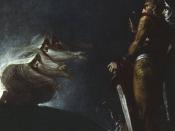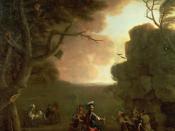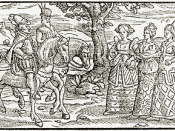Romancing the Crown An essay on Macbeth's Lust for Power By Jacob Rivers In Act I, Scene 1 of William Shakespeare's Macbeth, the witches foreshadow their protÃÂégÃÂé's coming power struggle in their chant "Fair is foul, and foul is fair/Hover through the fog and filthy air." It is Macbeth himself who will hover when he hears their prophecy and he will fulfill it by twisting everything that is foul into an illusion of fairness and that which is fair becomes utterly distasteful to him.
When the Thane of Cawdor is found treasonous and Duncan's bestows the title on his beloved and noble warrior, Macbeth, the newly honored thane is pleased but unsatisfied because he knows he cannot quickly come to the throne as the witches promised him. Enter the Lady. She assures her husband that her passion will make up for his character that is "too full o' the milk of human kindness"æ".
The lady that is so proclaimed fair turns foul and all but holds her husband's hands as he stabs their king.
Macbeth's lust for power is whetted by his murder of Duncan. His ruminations remind him that Banquo is the one upon whom the witches bestowed the more settled prophecy: "thou shalt get kings"æ". In Macbeth's mind, he is given to believe that his bloodstained hands are thus only for the furtherance of Banquo's issue. Time to act and this time, without needing or involving his wife's assistance.
In Shakespeare's fascination with conscience and the realm of spirits, Banquo's ghost visits Macbeth at a very inconvenient time. Celebrating his newfound power and influence, the king by default is horrified that his chair at the banquet table is taken by the bloody apparition of his friend whom he has had murdered at the hands of his henchmen. Lady Macbeth is stunned by his disturbance and herself begins wondering if his power climb was too much and premature. Macbeth, however, comes to an even deeper conviction to stabilize his power and seeks the advice of his crones.
Aware that his power has been given him through foul play, Macbeth decides that the best foul players, the witches, can help him further his influence. His apparitions give him ambiguous messages about his coming fate. It is here that Shakespeare's master craftsmanship is displayed in this tragedy. What Macbeth interprets in his power hungry mind as assurances that he is undefeatable is actually communicating his unnatural demise. "Macbeth shall never be vanquish'd until Great Birnam Wood to high Dunsinane Hill shall come against him." "That will never be!" Macbeth asserts believing that such a foul and unnatural assault is impossible. What he fails to realize, however, is that his own unnatural behavior which has enabled him to assume power, has set in motion a great wave of unnatural forces that inevitably fall against him.
Shakespeare's Macbeth dies from his own tragic flaws but his complex character does not die easily. He flouts his fate and will not give up his lustful power struggle until his scheming head is cut from his body.
Macbeth's death heralds the end of his ruthless reign but his legacy is not ended and finds mirror images throughout history. Shakespeare's genius is recalled in every despot's thirst for power and even in an individual's tendency to turn that which is fair into that which becomes foul and destructive.





